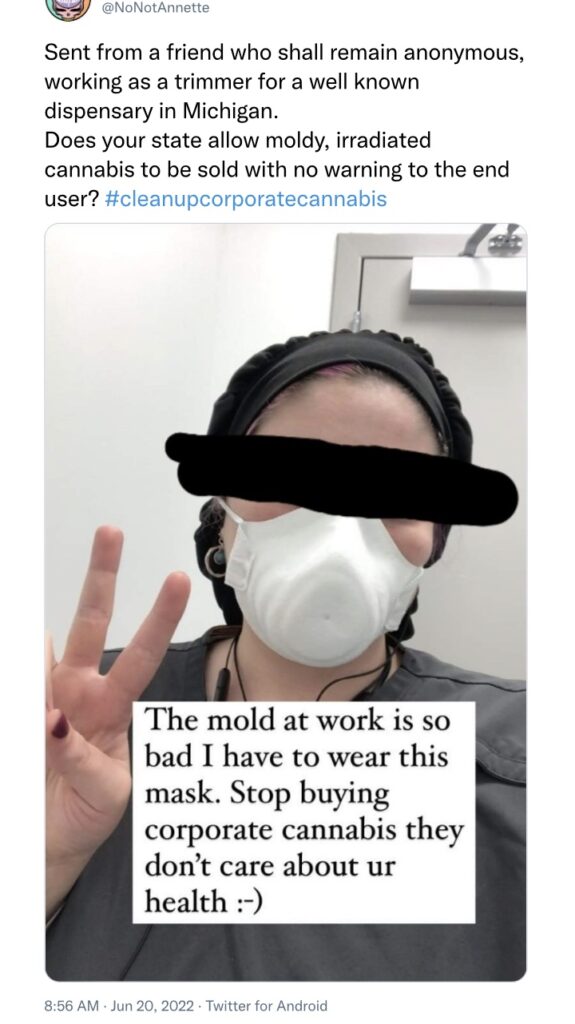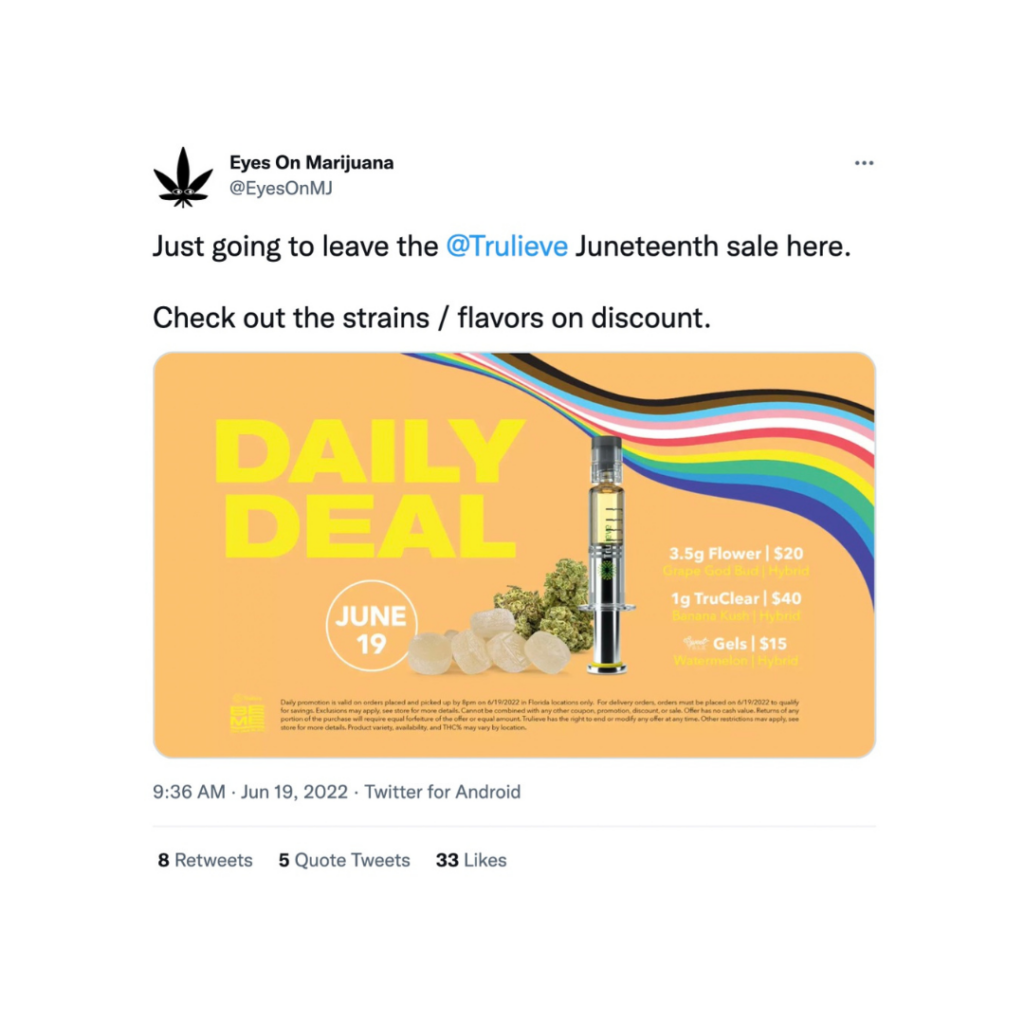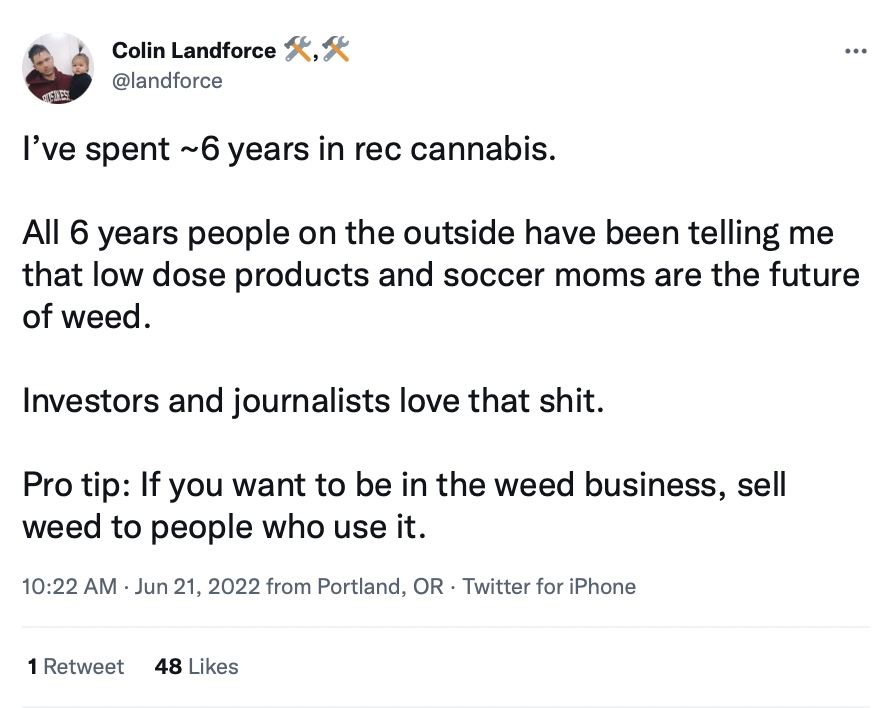21 June 2022 | Cannabis
Corporate mold, cultural insensitivity, and low-dose cannabis products in 2022
By Kaitlin Domangue
Moldy corporate cannabis

At this point, we’ve all heard mold stories in cannabis. Whether on the final product or in the facilities – mold has been a problem for a plethora of companies.
Oftentimes, corporate cannabis companies are being blamed. So large, public companies like Trulieve and Canopy Growth with a board of directors and all that corporate jazz are who most are referring to when they say “corporate cannabis companies.”
I certainly believe that corporate companies are about as far detached from cannabis reality as you can be. They often select executives who know nothing about cannabis and it shows, y’all.
Case in point: take a look at this Tweet I shared the other day about a post from Tilray. Unbelievable. They had the sense to delete it, but I definitely wish I could’ve caught a glimpse of the comments section before taking it down.
With all of this being said – corporate companies aren’t the only companies to blame for poor processes and bad products.
Obviously, the Tweet I’m sharing is about a corporate cannabis company, so this example is a corporate instance.
But I often see people who believe that only corporate cannabis companies have these problems, and switching to smaller, employee-owned & legacy companies will solve their problems.
And that’s just not true. At all.
Hiring someone with no cannabis knowledge to run the facility is a recipe for mold, corporate or not. And even with the best minds in cannabis, mold can sometimes still happen.
But that’s not what I’m talking about here, I’m talking about poor business decisions leading to quality control problems like mold.
Smaller, non-corporate companies are growing and selling moldy weed all the time. It’s not just happening at MSO giants, trust me on this.
And in many cases, these people do know about cannabis. They are just too profit-driven to care about the repercussions of selling moldy products or don’t have proper procedures in place to prevent quality issues.
What I’m Thinking 🧠
Instead of focusing on removing our support from corporate cannabis to prevent mold, we need to focus on removing our support from people who don’t know cannabis. And most importantly, from people who don’t care about consumers.
This doesn’t mean corporate cannabis deserves a pass. They don’t. There are plenty of reasons to avoid larger companies like this, but they aren’t the only ones selling moldy products, so avoiding them won’t eliminate the mold issue and ensure you are shopping only from people who care about your health.
Removing our support from smaller, problematic companies can be challenging. The true state of who license holders are is anything but transparent. They are buried under LLC after LLC which makes it impossible to tell who the true decision-makers are. Plus, license holders don’t always hold the power – investors do. Non-cannabis investors are aplenty. So it’s not as easy as weeding out smaller companies, either.
So, what do we do?
The recipe for change comes from us – the industry professionals. We have to keep pushing for standardized quality control as a unit. This holds all cannabis companies accountable. Organizations like FOCUS are doing good work in this area.
We shouldn’t wait for the federal government to grant FDA oversight – our industry needs to create our own oversight and regulations that go deeper than standard COAs, starting at the state and local levels.
Trulieve majorly dropped the ball on Juneteenth

Remember when I said (up there ^^) corporate cannabis gives us plenty of reasons to boycott, and are about as far detached from cannabis reality as you can be?
This is exactly what I mean.
This tweet didn’t even need to elaborate beyond posting the picture. Seriously, who approved this? I almost didn’t believe it was real – but it is, my friends.
The flavors of these products are racially-charged, whether it was intended to be or not.
There are plenty of people who would stop this in its tracks and nobody did, so that signals an internal problem at Trulieve.
There are so many layers to unpack here – so let’s start.
- Juneteenth doesn’t necessarily need a sale, y’all. I’d almost argue that it doesn’t need a sale, especially if you find yourself saying “Juneteenth is coming. What sale should we do?” and aren’t a Black-owned brand. Just stop and don’t do a sale. It needs to be authentic and genuine, especially for a time as sensitive as this. Forcing a sale isn’t authentic or genuine.
- The flavors. Just… why. This is so offensive and infuriating. Obviously, I’m not Black, so I can’t speak on behalf of Black people, but I can imagine this is less about the flavor choices themselves and more about the fact that nobody considered how the flavor choices could be offensive before releasing it?! It just shows a true lack of care and empathy during such a sensitive time and raises questions about any internal diversity efforts at Trulieve when things like this happen.
I really don’t like calling out cannabis companies by name. With almost 25,000 subscribers and a pretty large cannabis community on LinkedIn: I don’t like calling people out.
But this is just bad, y’all. No matter how you spin it. I have to call it out.
There were multiple departments involved with approving the sale’s execution and building marketing assets around that sale, then posting it online.
Trulieve acknowledged and apologized for the error, and says they are “continuously working through our internal processes to ensure we have the diversity of thought and inclusive representation on all our platforms.”
Unsurprisingly, this apology isn’t cutting it for plenty of people, and for them: this mishap was the final straw.
What I’m Thinking 🧠
There is a real need for DEI efforts.
Not only will it prevent embarrassing and harmful blunders like this from happening, but there’s a direct benefit to your ROI.
Organizations boasting above-average gender diversity and levels of employee engagement outperform companies with lower levels of diversity and engagement by a whopping 46% to 58%.
There’s no reason why a large company like Trulieve shouldn’t have active DEI efforts in place.
There are different ways to implement DEI strategies into your daily workflow, but I’m by no means the expert.
So I’ll redirect you to Ciera Parks, McKensie Kahnweiler, and Shoran Reid Williams – they are just three powerhouse cannabis DEI leaders to connect with and learn from on LinkedIn!
All cannabis companies should learn from mistakes like Trulieve’s and swiftly implement techniques to avoid this issue in the future.
Are low-dose products a pipe dream?

I don’t think low-dose products are the future of weed. But I do think they are a strong, self-sustaining product category.
Heavy consumers won’t suddenly shift to 3-milligram gummies – there’s an entire market who won’t be joining the low-dose movement – at least full-time.
A 2018 BDSA report found that California sales of low-dose and micro-dose products far outpaced sales of typical cannabis products. 35% of consumers reported preferring low-dose edibles during that time.
In my opinion, in the cannabis industry, everything feels like the next big thing. And that’s because it literally is.
But, I do think Colin has a point. Low-dose products aren’t the future of weed. (And for the record, plenty of soccer moms aren’t microdosers – but full-fledged consumers.)
But, that doesn’t mean low-dose products aren’t a strong category all on their own. I believe they are a self-sustaining category and will continue to be, just not as “the future” of weed.
Low-dose and high-dose cannabis products address different needs. A medical consumer won’t look for a 3-milligram cannabis drink. A social consumer isn’t typically going for an infused pre-rolled joint. People who are transitioning away from alcohol probably don’t want something high in THC.
Both types of products need to exist to serve different needs. But I think most consumers will continue to go for higher-dose cannabis products than low-dose products.
What I’m Thinking 🧠
I think even though the product category might be smaller than others, we should continue entering and advocating for a low-dose market. More than one type of cannabis consumer exists and low-dose products can meet different needs.
Predicting anything in cannabis is challenging, especially as consumers are experimenting with several product formats, doses, and brands. Low-dose products also help people transition away from alcohol.
I think the most important thing is staying in your lane – as I’ve said many times before. Don’t add a low-dose cannabis product to your lineup just because it’s trendy.
The product category is small, so companies genuinely invested in the low-dose movement are more likely to attract and retain low-THC consumers.